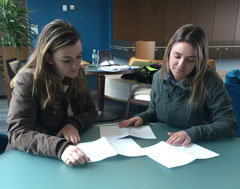UMSN Students Join Faculty Research on Global Domestic Violence
“Before coming to college, I didn’t know there were opportunities in nursing besides the clinical setting,” says Angela Wysocki, an Honors Program student at the University of Michigan School of Nursing. “This project opened up my eyes a lot to different perspectives on women's health and how women are viewed so differently from one country to the next.”

Wysocki, fellow UMSN Honors Program student Jane Roach, and Erin Misch are working on international domestic violence research with UMSN Associate Professor Denise Saint Arnault, PhD, RN, FAAN. And for all three students, their interest in research and learning about the variety of opportunities came as a surprise.
“I only knew of the lab-based, petri-dish type of research,” says Roach. “This project showed me that it can be so much more. The research that we do is focused on dealing with people and all of their complexities. I can actually look at data and imagine how it applies to people that I have met or patients that I might have in the future.”
“After taking my introduction to research course, I realized that I was very interested in research, which was surprising for me,” says Misch. “I love the practice side of nursing, but now I love the research aspect of it.”
Dr. Saint Arnault’s research focuses on cultural dynamics of help-seeking behaviors, and understanding why certain people or groups do not seek help for a variety of issues. She says she was inspired to expand her focus after a European Union Agency for Fundamental Rights (FRA) report found only 2-20% of European women seek help for domestic violence.
“That prompted me to say wait a minute, this help-seeking phenomenon is broader than cultural dynamics,” says Dr. Saint Arnault. “It is sociocultural and that really matters for traumatized women and their help-seeking journey.”
Using a grant from U-M’s Institute for Research on Women & Gender (IRWG), Dr. Saint Arnault began a feasibility study to compare five European countries. With partners in Italy, Ireland, Spain, Portugal and Romania, “we will be looking for cross-cultural differences or similarities, and then we’ll do more research from there,” says Dr. Saint Arnault. “We plan to make both policy and practice recommendations.”
Wysocki and Roach traveled to Italy with Dr. Saint Arnault for the initial multi-national consortium meeting. “The students extracted data from the FRA report and presented a compare-and-contrast report for the group,” says Dr. Saint Arnault. The students also prepared documents and worked with Dr. Saint Arnault to prepare translated materials for each country.
 Each student will also focus on their own interest area as the project progresses. “I'm interested in the different resources women have based on which country and region they're in,” says Wysocki. “I hope to find interventions women themselves think would be most helpful. I think it's important to get the victims’ voices and use them throughout the process.”
Each student will also focus on their own interest area as the project progresses. “I'm interested in the different resources women have based on which country and region they're in,” says Wysocki. “I hope to find interventions women themselves think would be most helpful. I think it's important to get the victims’ voices and use them throughout the process.”
Misch says she is also interested in developing broader research skills such as data analysis and proposing research questions. “I also hope to get a better idea of what my future research will involve,” says Misch. “Dr. Saint Arnault will help guide my interests and encourage new areas to study.” This goal is consistent with the early phase goals of the Hillman program.
While Dr. Saint Arnault has been a part of service-oriented study abroad experiences in Mexico and Japan, this is the first time she has taken undergraduate students on a research trip. “You light their fire on research,” says Dr. Saint Arnault. “Global Health is sort of an abstract concept, but this was their opportunity to see how international research goes, including the group dynamics and how an international leader manages all the languages and research materials.”
“Working with the representatives from the other countries proved to me that many uniquely human qualities can be universally understood,” says Roach. “There is so much to learn from experts elsewhere and it is important for us to be active participants in the global community.”
 The students agree that the experience opened their eyes to more career opportunities.
The students agree that the experience opened their eyes to more career opportunities.
“Working with Dr. Saint-Arnault has absolutely encouraged me to look beyond clinical practice and push myself to take on leadership opportunities,” says Roach.
“I'm really interested in working on health policy or nonprofits, and think I would want to focus internationally,” says Wysocki. “I'm not exactly sure how I'd get there, but that's the best part of nursing. There are so many different pathways to wherever you want to go.”





